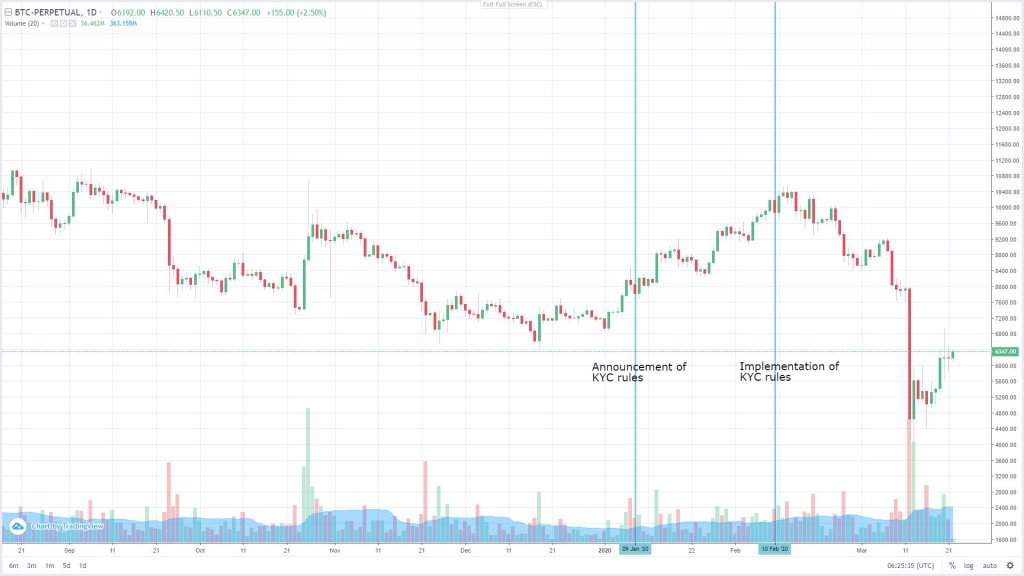 BitMEX may be about to add KYC, and that’s bearish for Bitcoin: traders explain why
BitMEX may be about to add KYC, and that’s bearish for Bitcoin: traders explain why BitMEX may be about to add KYC, and that’s bearish for Bitcoin: traders explain why

Cover art/illustration via CryptoSlate. Image includes combined content which may include AI-generated content.
BitMEX, the leading Bitcoin and crypto-asset derivatives exchange, has long played a central role in these nascent markets.
The firm’s Bitcoin (XBT) perpetual swap — the infamous vehicle that allows traders to 100x leverage their capital in exchange for mind-blowing profits or a brutal margin call — just months ago passed $2 trillion in contracts traded. That number has likely started to tick towards $3 trillion, especially considering the recent volatility.
BitMEX’s swap has been so key to Bitcoin that a good portion of the brutal crypto market crash seen on Mar. 12 and 13 — during which BTC fell more than 50 percent at the crisis’ worse — was purportedly driven by BitMEX liquidations alone, as reported by CryptoSlate previously.
Some analysts even argued that without BitMEX shutting down near the point of maximum pain of the crash (now revealed to be caused by a malicious attack), BTC would have gone to $0. Literally.
BitMEX’s importance to the structure of the entire Bitcoin market hasn’t gone unnoticed by authorities and critics.
And this scrutiny has seemingly tipped the exchange’s hand, with a prominent trader revealing that know-you-customer (KYC) procedure is likely soon to be implemented — a reversal from one of BitMEX’s biggest benefits over its competitors: seemingly no identity verification is required to trade hundreds, thousands, or even millions worth of Bitcoin.
Top Bitcoin derivatives exchange may soon be implementing KYC

A prominent pseudonymous behind Whalecalls.io known as “I am Nomad” (for the purposes of this article, we’ll call him “Nomad”), recently found that BitMEX’s official company account on LinkedIn (and on AngelList) is advertising a new role: “AML Operations Manager” to be based in Hong Kong, where the company has rented out a luxurious office in one of the world’s most expensive buildings, seen in the image attached (credit: this writer).
The job description included “2 key functions,” one of which mentions the development and management of “conducting customer due diligence for institutional and retail clients onboarding or existing on the BitMEX platform. […] They will be responsible for the customer screening process associated with AML and Sanctions requirements.”
According to Nomad, who is well connected in the industry, the individual hired will be “design[ing a] KYC plan for general customer [sic],” adding that “we all knew it was coming to the masses.” This makes sense, especially considering the wording of the job description.
The Bitcoin exchange’s decision to shift towards a KYC model comes after it has come under fire from some of the world’s biggest financial regulators.
Famously, in July of last year, Bloomberg revealed that according to “people familiar with the matter,” authorities at the U.S. Commodity Futures Trading Commission, which presides over Bitcoin derivative vehicles, have begun to investigate the exchange.
This news report came literal days after Nouriel Roubini, Stern School of Business at New York University professor and a noted hater of Bitcoin, lambasted BitMEX of “systematic illegal activities.”

Ditch BitMEX?
Although there are no details about BitMEX’s purported planned KYC procedure that Nomad is referring to, many prominent crypto traders have responded adversely to the move, echoing the response traders had to a BitMEX competitor’s move to add KYC just months earlier.
A Crypto trader known as Akado opined that once the KYC is implemented (if it is implemented), “there will be no reason left for people to use it.”
If Bitmex KYCs, there will be no reason left for people to use it https://t.co/My0az8wNAm
— Akado 'Bitcoin Halving in 50 days' Sang (@AkadoSang) March 22, 2020
Other notable figures echoed this sentiment to a T, with names like Romano and Josh Rager in response to this BitMEX news promoting other margin exchanges that don’t currently abide by KYC regulation, presumably because they’re located in a certain jurisdiction and/or have not been caught by the ire of a financial regulator.
Could this action dramatically harm Bitcoin?
Although traders migrating their trading to an alternative exchange seems simple enough, some have proposed that BitMEX’s potential decline caused by the implementation of KYC will have a lasting effect on the structure of the Bitcoin and cryptocurrency markets.
Analyst CryptoDonAlt, who called much of the recent downturn in Bitcoin’s price, remarked that “once we (referring to BitMEX traders) get KYC, I don’t think alts will do as well [anymore].” The thought process behind this opinion was not fully explained, though it may have something to do with BitMEX’s altcoin derivatives.
Furthermore, Stackin’ Bits remarked that if BitMEX starts to see its business wane, Bitcoin will be seriously affected:
“For me, one of the biggest things that makes me bearish on this is that a lot of the bigger money has already left Mex. Maybe it was market conditions, or maybe some of them already knew KYC was coming…. but the bearish scenario is the survival of Mex… and their insurance fund.”
In layman’s terms, what the analyst is saying is that a slowdown in BitMEX’s business will likely lead the exchange to liquidate a portion of its insurance fund, used to prevent damage if market conditions adversely affect the settlement of its high-leverage derivatives, due to less volume and open interest on its platform.
As BitMEX’s insurance fund holds a sum of around 35,000 BTC — $224 million at the current price of $6,400 — the sale of even half that fund would have a large impact on the price of Bitcoin.
There isn’t exact data on the damage the sale of tens of thousands of BTC will have on the market, though the story goes that the PlusToken Ponzi scheme, which has slowly been selling off thousands of Bitcoin through exchanges, was a large driver of crypto’s 50 percent drawdown in the second half of 2019.
The point in referring to this story being: a liquidation of over 10,000 BTC by BitMEX would likely have a non-zero negative impact on the price of Bitcoin and other cryptocurrencies, especially considering the current illiquidity in the markets, a byproduct of the coronavirus crisis.
KYC likely not the end of the world for BitMEX
Stackin’ Bits’ remark about the BitMEX’s theoretical survivability in the wake of a KYC implementation comes with him seeing a non-zero possibility that the exchange won’t survive this change in its business strategy.
The issue is, there is no evidence to suggest that the implementation of KYC will put a large-scale Bitcoin exchange out of business: earlier this year, on Jan. 9, another top crypto derivatives exchange, Deribit revealed that it would be implementing mandatory KYC protocol due to pressure from the European Union, which included crypto companies in its latest anti-money-laundering directive.
The measures included the submission of a legal name, address, date of birth, and even a passport if certain features were to be unlocked. As this was a change from Deribit’s history of relatively-lax KYC policy, traders also feared the exchange would be subject to a mass reduction in business.
But according to CryptoSlate’s cursory glance of the volume of Deribit’s BTC perpetual swap, both the announcement of the KYC rules and the implementation of the KYC rules on the platform had no notable impact on market activity.

In fact, Deribit’s post-KYC volume data looks very similar to that of other crypto exchanges, with volumes rallying into the February highs of $10,500, then increasing dramatically during the flash crash seen on Mar. 12 and 13.
There is the case of both Bitfinex and Bittrex, though, whose implementation of stricter KYC protocol seemingly coincided with a large decrease in their share of the crypto exchange market.
But even still, these two exchanges, stalwarts of the cryptocurrency industry, remain anything but dead, providing hope for a post-KYC BitMEX and its volumes.
What’s more likely than KYC wiping BitMEX out, then, seems to be a scenario in which the exchange gets overtaken by competitors like the partially Binance-owned FTX, which has already begun to give BitMEX a run for its money — or in this case, a run for its Bitcoin.














































































































